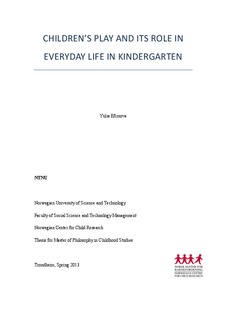| dc.contributor.advisor | Nilsen, Randi Dyblie | nb_NO |
| dc.contributor.author | Efimova, Yulia | nb_NO |
| dc.date.accessioned | 2014-12-19T14:37:36Z | |
| dc.date.available | 2014-12-19T14:37:36Z | |
| dc.date.created | 2014-01-03 | nb_NO |
| dc.date.issued | 2013 | nb_NO |
| dc.identifier | 683360 | nb_NO |
| dc.identifier.uri | http://hdl.handle.net/11250/269088 | |
| dc.description.abstract | In the present master thesis play of young children and it’s role in their everyday life in the setup of state kindergartens in Russia were explored. The reason why I have addressed to this topic is the lack of free time for play in kindergarten’s of Moscow due to a very busy time scheduler in kindergartens, filled with different activities organized and controlled by adults. The fieldwork that this research is based on was conducted in one of state kindergartens of Moscow in Autumn 2011. I used method of participant observation as the main research method in this study. My main informants were 25 young children between 5 and 6 years attending the kindergarten.
A theoretical framework of this study was provided by Social studies of children and childhood. Play is seen in frames of cultural analytical perspective as a part of children’s culture, where children are appearing to be active agents. Children’s play culture is not homogenous so different cultural changes impact children’s play culture. Also in this thesis play I am seeing as part of children’s everyday life.
In this study I have elaborated only on some aspects of children’s play and its role in their everyday life in kindergarten: time and place for play in children’s everyday life; diversity of play in kindergarten’s setup; participation in play and role of adult’s in play as a part of children’s everyday life. Importance of children’s agency in their everyday life was specially emphasized.
Study findings confirm that everyday life of children in the studied state kindergarten is very busy and filled with different activities, most of which are organized and controlled by adults. Children use any opportunity to play. Activities, organized and controlled by teachers are seen by children as a part of their everyday life, but at the same time as their duty. They not always like this activities and rather often getting tired from them. Adults (teachers) can be allowed by children to participate in children’s play but children do not let them to have main initiative and control in their play. The level of adult’s control can be seen as a criteria for children’s choices of place to play: children prefer places where adults have less control. In play children are active agents and meaning makers so play can be seen as one of activities in which children have the opportunity to resist adult’s control in kindergarten. | nb_NO |
| dc.language | eng | nb_NO |
| dc.publisher | Norges teknisk-naturvitenskapelige universitet, Fakultet for samfunnsvitenskap og teknologiledelse, Norsk senter for barneforskning | nb_NO |
| dc.title | Children's play and its role in everyday life in kindergarten | nb_NO |
| dc.type | Master thesis | nb_NO |
| dc.contributor.department | Norges teknisk-naturvitenskapelige universitet, Fakultet for samfunnsvitenskap og teknologiledelse, Norsk senter for barneforskning | nb_NO |
